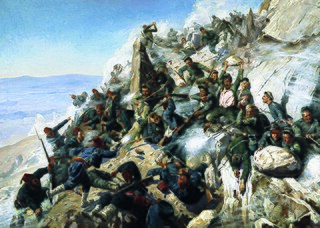 W
WThe Battle of Plovdiv, or Battle of Philippopolis, was one of the final battles of the 1877-1878 Russo-Turkish War.
 W
WThe Liberation of Bulgaria is a historical process as a result of the Bulgarian Revival.
 W
WThe Kresna–Razlog Uprising named by the insurgents the Macedonian Uprising, was a Bulgarian uprising against the Ottoman rule, predominantly in the areas of Kresna and Razlog in late 1878 and early 1879. It broke out following the protests and spontaneous opposition to the decisions of the Congress of Berlin, which, instead of ceding the Bulgarian-populated parts of Macedonia to the newly reestablished Bulgarian suzerain state per the Treaty of San Stefano, returned them to Ottoman control. It was prepared by the "Edinstvo" Committee.
 W
WThe Republic of Tamrash, was a short-lived self-governing administrative structure of the Pomaks, living in the Tamrash region of the Rhodope Mountains. It existed from 1878 to 1886.
 W
WThe Russo-Turkish War of 1877–1878 was a conflict between the Ottoman Empire and the Eastern Orthodox coalition led by the Russian Empire and composed of Bulgaria, Romania, Serbia, and Montenegro. Fought in the Balkans and in the Caucasus, it originated in emerging 19th-century Balkan nationalism. Additional factors included Russian goals of recovering territorial losses endured during the Crimean War of 1853–56, re-establishing itself in the Black Sea and supporting the political movement attempting to free Balkan nations from the Ottoman Empire.
 W
WThe Battle of Shipka Pass consisted of four battles that were fought between the Russian Empire, aided by Bulgarian volunteers known as opalchentsi, and the Ottoman Empire for control over the vital Shipka Pass during the Russo-Turkish War (1877–1878). The crucial moment came in August 1877, when a group of 5,000 Bulgarian volunteers and 2,500 Russian troops repulsed an attack against the peak by a nearly 40,000 strong Ottoman army.
 W
WThe Treaty of Berlin was signed on 13 July 1878. In the aftermath of the Russian victory against the Ottoman Empire in the Russo-Turkish War of 1877–1878, the major powers restructured the map of the Balkan region. They reversed some of the extreme gains claimed by Russia in the preliminary Treaty of San Stefano, but the Ottomans lost their major holdings in Europe. It was one of three major peace agreements in the period after the 1815 Congress of Vienna. It was the final act of the Congress of Berlin and included Great Britain and Ireland, Austria-Hungary, France, Germany, Italy, Russia and the Ottoman Empire. Germany's Otto von Bismarck was the chairman and dominant personality.
 W
WThe 1878 Treaty of San Stefano was a treaty between Russia and the Ottoman Empire signed at San Stefano, then a village west of Constantinople, on 3 March [O.S. 19 February] 1878 by Count Nicholas Pavlovich Ignatiev and Aleksandr Nelidov on behalf of the Russian Empire and by Foreign Minister Saffet Pasha and Ambassador to Germany Sadullah Bey on behalf of the Ottoman Empire. The treaty ended the Russo-Turkish War, 1877–78.